[Click on BLUE links for further information]
“Where they burn books, so too will they in the end burn human beings.”
Heinrich Heine, Almansor

Sea Gull Cellar Bar Napkin Art, Roy Hoggard artist
Censorship has many faces: burning books, burning witches, burning heretics. While not as dramatic, the most insidious face of censorship is the subtle imposition of beliefs into the heads of the unsuspecting in such a way that they censor themselves.
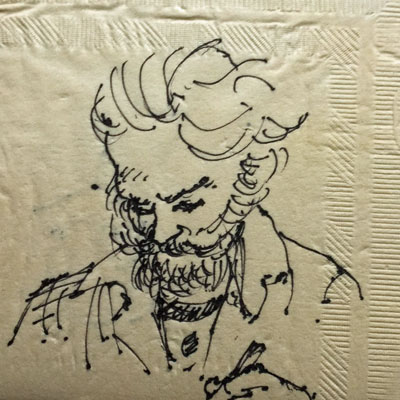
Sea Gull Cellar Bar Napkin Art
Why do we censor ourselves, often without knowing? Conscience, God, or a fluke that enters our brain and takes control–peer pressure from others who have been infected with one of the above. Self-censorship can be a good thing when we are touched by the darker angels of our nature (to rephrase Lincoln). Unfortunately the darker angels are difficult at times to separate from the better angels.
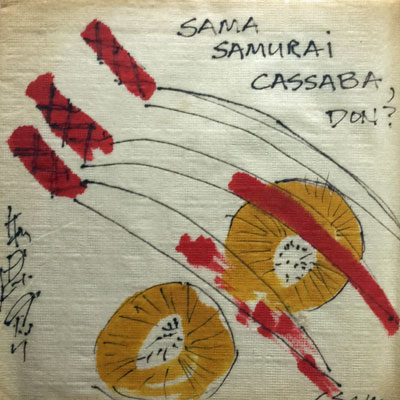
Sea Gull Cellar Bar Napkin Art, Cindy Swan artist
There is a scene in The Great Gatsby where George, whose wife is cheating on him, is speaking about his problem to Michaelis, the owner of a coffee shop. Outside the window the eyes of T. J. Eckleburg bear down on the coffee shop. Nick, the narrator, describes those eyes earlier in the book:
But above the grey land and the spasms of bleak dust which drift endlessly over it, you perceive, after a moment, the eyes of Doctor T. J. Eckleburg. The eyes of Doctor T. J. Eckleburg are blue and gigantic – their retinas are one yard high. They look out of no face but, instead, from a pair of enormous yellow spectacles which pass over a nonexistent nose. Evidently some wild wag of an oculist set them there to fatten his practice in the borough of Queens, and then sank down himself into eternal blindness or forgot them and moved away. But his eyes, dimmed a little by many paintless days under sun and rain, brood on over the solemn dumping ground… I followed [Tom] over a low white-washed railroad fence and we walked back a hundred yards along the road under Doctor Eckleburg’s persistent stare… “Terrible place, isn’t it,” said Tom, exchanging a frown with Doctor Eckleburg.
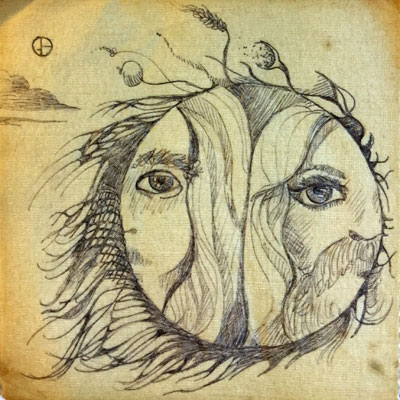
Sea Gull Cellar Bar Napkin Art, artist unknown
In the coffee shop scene, Michaelis tries to console George who is despondent over his wife’s infidelity:
“Have you got a church you go to sometimes, George? Maybe even if you haven’t been there for a long time? Maybe I could call up the church and get a priest to come over and he could talk to you, see?”
“Don’t belong to any.” …
Wilson’s glazed eyes turned out to the ashheaps, where small grey clouds took on fantastic shape and scurried here and there in the faint dawn wind.
“I spoke to her,” he muttered, after a long silence. “I told her she might fool me but she couldn’t fool God. I took her to the window—“ With an effort he got up and walked to the rear window and leaned with his face pressed against it,” –and I said ‘God knows what you’ve been doing, everything you’ve been doing. You may fool me but you can’t fool God!”
Standing behind him Michaelis saw with a shock that he was looking at the eyes of Doctor T. J. Eckleburg which had just emerged pale and enormous from the dissolving night.
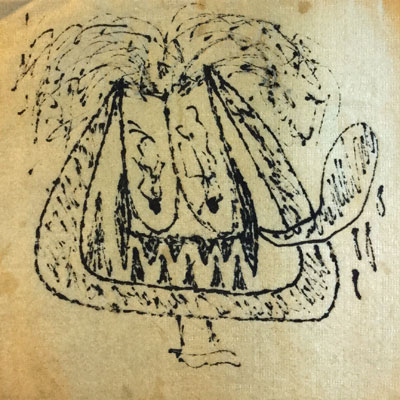
Sea Gull Cellar Bar Napkin Art, artist unknown
“God sees everything,” repeated Wilson.
“That’s an advertisement,” Michaelis assured him. Something made him turn away from the window and look back into the room. But Wilson stood there a long time, his face close to the window pane, nodding into the twilight.
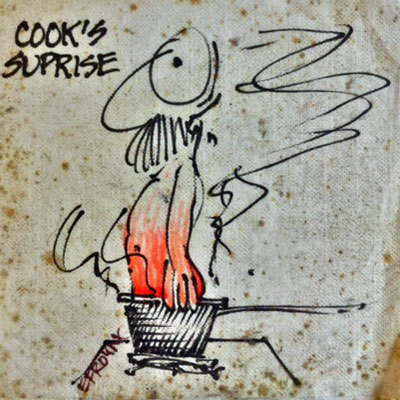
Sea Gull Cellar Bar Napkin Art, Efrom artist
According to Napoleon: “Religion is excellent stuff for keeping common people quiet. Religion is what keeps the poor from murdering the rich.” True believers practice a sort of self-censorship. Others, like the eccentric mathematician Paul Erdos, mock the watchful eyes. This is not a bad coping tactic when you know you’re being taken for a ride. Erdos calls these watchful eyes the eyes of the SF.
The SF is the Supreme Fascist, the Number-One Guy Up There, God, who was always tormenting Erdös by hiding his glasses, stealing his Hungarian passport, or, worse yet, keeping to Himself the elegant solutions to all sorts of intriguing mathematical problems. “The SF created us to enjoy our suffering,” Erdös said. “The sooner we die, the sooner we defy His plans.”
Self-censorship works best as a control tool when the victim comes to it unexpectedly through a “trick of fate.” Luisa Valenzuela, the famous Argentine author, wrote a short story called The Censors. The surprise ending of the story describes how the principal character, Juan, changed from working in his own interest to working in the interest of the censors. In the story Juan flips through a “trick of fate” to become the ultimate censor.
“His Basket of Condemned Letters soon became the best nourished but also the most subtle in the whole Censorship Bureau. He was at the point of feeling proud of himself, he was at the point of knowing that he had finally found his true path, when his own letter to Mariana reached his hands. Naturally he condemned it without remorse. And just as naturally he couldn’t prevent them from executing him at dawn, one more victim of his devotion to work.”
Any one of us can be undermined by a “trick of fate” like Valenzuela’s Juan. The philosopher Daniel Dennett tells a wonderful story about why an ant would climb to the top of a blade of grass to be ingested by a cow. The ant’s brain has been invaded by a “fluke” (a lancet fluke to be exact). It is in the fluke’s best interest (not the ant’s) to get inside a cow or sheep stomach to continue its life cycle. The ant acts in the fluke’s best interest because it’s brain has been commandeered.
In the era of Donald Trump, we have a President who exploits this tendency toward self-censorship brilliantly. Foreshadowed by George Orwell, Trump uses a combination of “doublespeak” (“fake news” and “alternative facts”) and trivialization of anyone who opposes him (“Little Marco”, “Ly’in Ted”, and the “failing press” where the “level of dishonesty is out of control.”) President Trump knows that repetition and doubling down on any proposition, true or not, is an effective tool for changing minds.
Trump conducts his campaign to lead the masses toward self-censorship by using a form of mind control. For example, what used to be called common decency morphs under Trump into “political correctness” and picks up negative connotations. Suddenly discretion is no longer the better part of valor. Trump’s use of doublespeak, trivialization, and mind control is not new. The far left has been using these techniques for years. It’s ironic that now, under Trump, such tactics have been embraced by the far right. (see Trump’s Latin American Model in the Boston Review) In both cases people turn against their own best interests without knowing it like the commandeered ants in Dennett’s story.
Trump may not know (although implicitly he must) that he is making very effective use of the meme, a concept developed by evolutionary biologist Richard Dawkins. A meme is “an idea, behavior, or style that spreads from person to person within a culture. Through the internet and especially with social networking applications such as Twitter, Instagram, and Facebook memes have become much more powerful. Populist authoritarians like Trump create memes allowing them to take over a society.
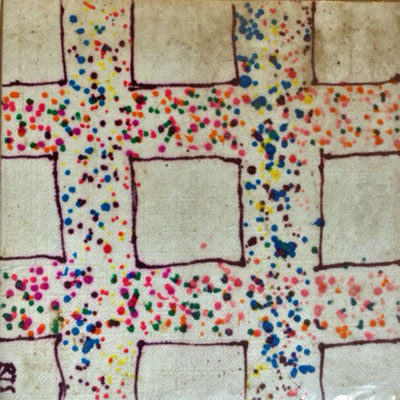
Sea Gull Cellar Bar Napkin Art, RTS artist
Any democracy will include many points of view. We like to form “teams” or “political parties” (the red and the blue). No team or party can fully represent any individual’s goals so the teams divide into varying factions with blended colors such as orange or yellow or purple.

Sea Gull Cellar Bar Napkin Art, Wanda and Sula artists
Making decisions in a democracy proceeds through debate and discussion. This is time consuming and frustrating. Furthermore, reason and philosophy seldom provide anyone with a definitive idea to live and die by, they seldom change people’s minds. They are too cold, too complex and many people just don’t want to put in the time. The heat of emotion speeds up the search in a satisfying way for those who either cannot or will not make their own decisions. Some who crave certainty fall into the comforting arms of religion or under the persuasive spell of a charismatic leader.
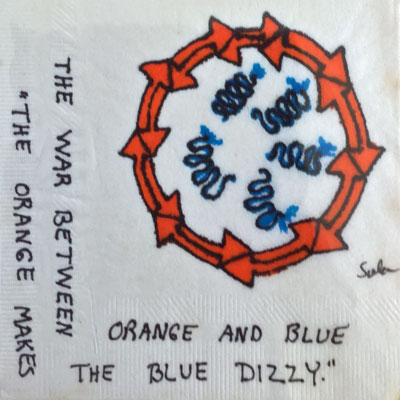
Sea Gull Cellar Bar Napkin Art, Sula artist
They become willing to suffer everything for an unquestioned faith and become fanatics. In a worse case they obediently commit atrocities. Fanatics assume, wrongly, that any commitment is better than none. What such true believers overlook is that while reason and philosophy cannot provide certainty they can safeguard a man against ideas for which he might better not live or die.
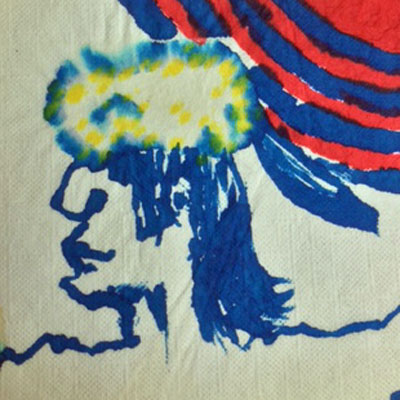
Sea Gull Cellar Bar Napkin Art, RTS artist
Historians have estimated the witch-hunt hysteria that peaked between the 15th and 18th centuries saw some 50,000 people executed as witches in Europe. Many of these victims were hanged or beheaded first, but their bodies were typically incinerated afterwards to protect against postmortem sorcery. Other condemned witches were still alive when they faced the flames, and were left to endure an excruciating death by burning and inhalation of toxic fumes.

Sea Gull Cellar Bar Napkin Art, Goslyn artist
Burning books remains a popular form of censorship even today, but burning witches, like burning heretics, is frowned upon by “civilized” people.
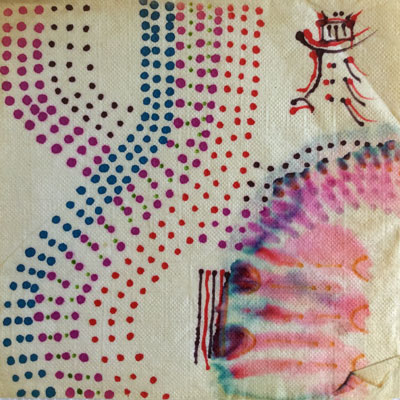
Sea Gull Cellar Bar Napkin Art, artist unknown
The poet William Blake tells us that a firm persuasion that a thing is so makes it so.
Then I asked: ‘does a firm perswasion that a thing is so, make it so?’
He replied: ‘All poets believe that it does, & in ages of imagination this firm perswasion removed mountains; but many are not capable of a firm perswasion of any thing.’
William Blake, The Marriage of Heaven and Hell
As I Blake fan I am bothered by this. A firm persuasion must be based on evidence and facts as well as the heart. However, Blake is right about one thing. When “many are not capable of a firm perswasion,” they can find themselves duped by a populist leader with authoritarian designs who will be happy to supply them with a meme to live by.
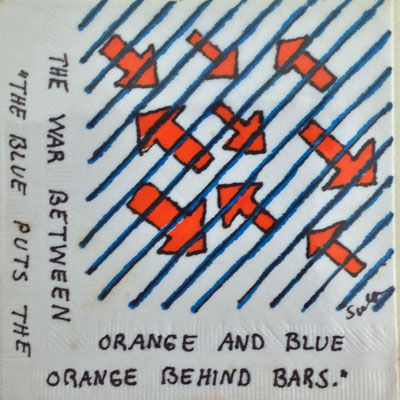
Sea Gull Cellar Bar Napkin Art, Sula artist

Sea Gull Cellar Bar Napkin Art, Sula artist
What can we do when confronted by the watchful eyes of the censors who try to control our lives with fake news, alternative facts, and trivialization? There is no easy answer but some useful ideas can be found here: Doctors have decades of experience fighting “fake news.” Here’s how they win.
We can bear witness as Margaret Attwood advises (Margaret Attwood on What the ‘Handmaid’s Tale’ Means in the Age of Trump). Pointing out what’s right before our eyes is important.
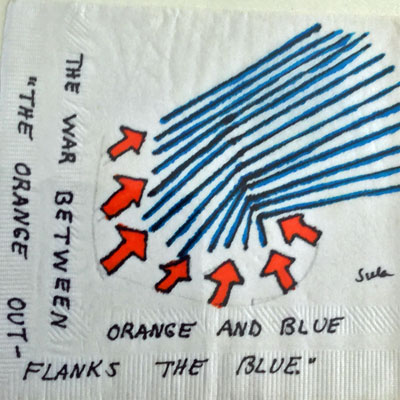
Sea Gull Cellar Bar Napkin Art, Sula artist
We can clear the lives and names of past martyrs as suggested by Walt Whitman in a dedication he wrote for a meeting held at the Contemporary Club in Philadelphia in 1890: “As America’s mental courage (the thought comes to me today) is so indebted, above all current lands and peoples, to the noble army of old-world martyrs past, how incumbent on us that we clear those martyrs’ lives and names, and hold them up for reverent admiration as well as beacons. And typical of this, and standing for it and all perhaps, Giordano Bruno may well be put, today and to come, in our New World’s thankfulest heart and memory.”
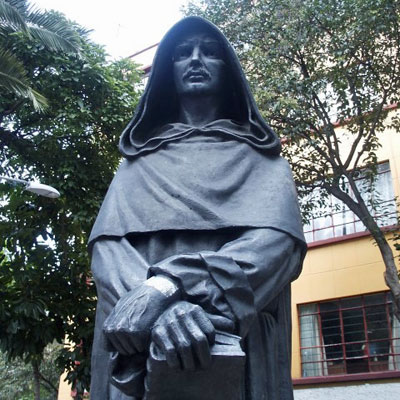
Statue in Giordano Bruno Plaza, Colonia Juarez, Mexico City.
Most of all we can guard ourselves, our minds and our hearts, against the watchful eyes of the censors. We can do the hard work of forming our own opinions while keeping what the Nobel physicist Richard Feynman calls “the open channel.” (Richard Feynman on the Meaning of Life) We can speak out whenever we see something we believe is wrong. We can refuse to be the commandeered ant, the meme-enthralled follower of others. We can refuse to stop creating our own lives.
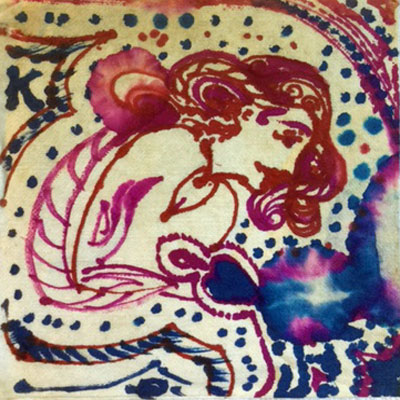
Sea Gull Cellar Bar Napkin Art, Kay Rudin artist

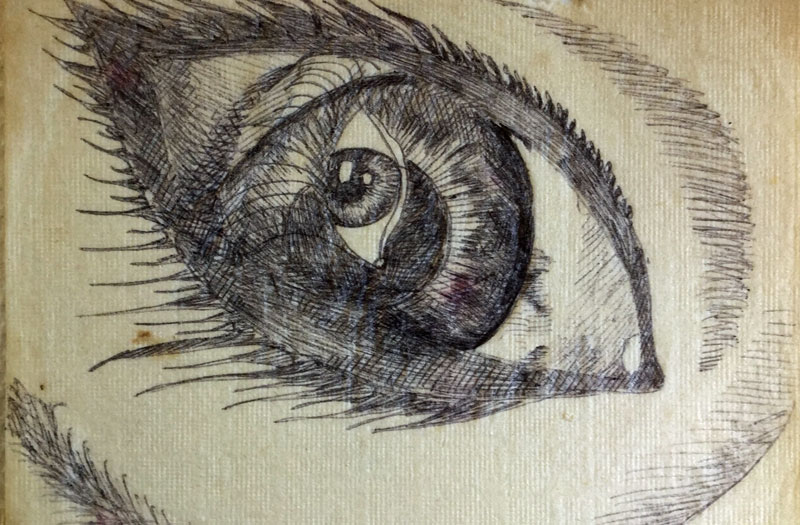
Don’t worry Dave….Trump has a new Giant Bomb in the arsenal that he will use to whip all of the critics and doubters and “thinkers” into place.
I am horrified daily at what is happening to us and this dangerous idiot in the White House. One of his supporters told me…he is just like Andrew Jackson…..I had just read AMERICAN LION by Jon Meacham….uhhhh…I was astounded by the comparison. One was a man with strengths and flaws and the other is a moron……
But…people believe this crap….I think I need to sit with you at the bar at ARI…
Thanks Matt. Yes, the bar definitely ! That’s the appropriate venue to drown all our sorrows.